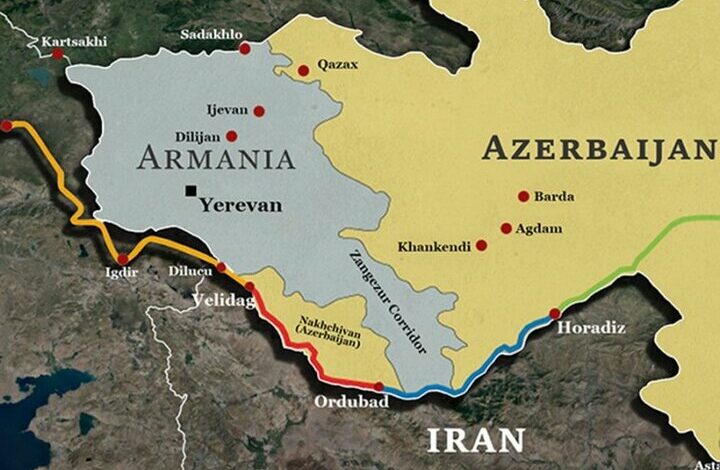International Dispute Over Zangezur Corridor: Scenarios and Potential Risks

according to the English section of webangah News Agency, citing Mehr News Agency, the Shams Studies Center’s analytical platform noted in a report that Iran’s foreign policy in the South Caucasus has traditionally aimed to maintain balance among regional powers. However, the announcement of establishing the Zangazur corridor has sparked meaningful concerns within Iranian political circles regarding its motives, outcomes, and implications for Tehran’s logistical interests.
These concerns intensified after Azerbaijan and Turkey announced their targeted plan to implement this corridor through Armenian territory-an issue that would shift regional dynamics in favor of Azerbaijan and at Iran’s expense. The project poses multiple threats to Iran’s geopolitical and economic interests. Key risks include possible border alterations disrupting land connectivity between Iran and Armenia; increased likelihood of Armenia aligning closer with Western blocs; diminishing transit advantages for Iran along the North-South corridor; strengthening Turkey’s influence regionally; and bolstering NATO’s presence on Iran’s northern borders.
First: Factors disrupting regional balance
Iran is a central regional actor in the South Caucasus. It closely monitors geopolitical changes that could affect its national security and strategic role-especially along its northern borders. In this context, the Zangazur corridor project raises profound concerns due to its potential effects on geopolitical equilibrium across transportation, energy security, national defense sectors, as well as efforts reshaping local alliances both regionally and internationally.
1. Regional border geopolitics: The issue of changing borders by severing terrestrial links between Iran and Armenia-and proposed land swaps between Armenia and Azerbaijan-is not new. Paul Goble first raised this idea in 1992,followed by Turkey introducing a “dual-corridor” concept that same year. Azerbaijani and Armenian officials later engaged in negotiations over territorial exchanges within this framework but failed due to domestic opposition on both sides.
2. armenia’s move toward the West increasing Iran’s strategic isolation: Relations between Iran and Armenia have been stable based on several geopolitical priorities governing their ties-particularly since Armenia shares borders with Azerbaijan and Turkey but lacks access to open waters. To break out of this blockade, Yerevan has reinforced relations with Tehran as a counterbalance against adversaries. However, executing ceasefire agreements alongside constructing zangazur Corridor accompanied by normalization steps with Azerbaijan and Turkey might reposition Armenia as a key link within an east-west transit route-weakening Yerevan’s critical reliance on tehran.
3. Reduced transport benefits for Iran: Iran enjoys essential advantages from being situated along an international North-South trade route integral to global logistics networks. It has invested heavily through projects like developing Chabahar port-with Indian collaboration-and enhancing transport links with central Asian countries plus Transcaucasia states. Nevertheless, activating Zangazur may severely undermine these competitive transit benefits passing through Iranian territory.
4. Growing Turkish influence : For centuries Caucasus lands have been contested among Russia, Turkey & Iran seeking dominance here.The current situation-with Russia engaged militarily in Ukraine-appears opportune for Ankara to expand power footholds locally while securing greater access to Caspian Sea oil & gas resources.
5.NATO expansion entrenched : NATO pursues enhanced engagement agreements across Central Asia & Caucasia states.Possible expansion here fueled speculation about Western ambitions leveraging existing Turkish membership status,to extend alliance influence eastward towards russia-Iran frontier regions .
6.Azeri-Israeli ties deepen :Azerbaijan maintains significant military-strategic partnerships with Israel whose economic cooperation blossomed significantly recently.The corridor grants Baku direct routes viaTurkey connecting Haifa & tel Aviv facilitating israeli presence bordering both Azerbaijani & Iranian territories .
The Second: Possible scenarios
The Shams studies Center outlined prospective pathways forward summarized below:
1.Achieving Agreement
An agreement among stakeholders is arguably most logical given none desire direct confrontation or consequences arising from fresh conflict within geopolitically sensitive environs.Politically ,militarily,and economically none holds readiness or appetite for wide escalation yet.All parties ought ideally enter bilateral talks supported neutrally via supportive policies from surrounding powers.Crucial preconditions include respecting status quo frontiers without forced alteration,pursuing reciprocal security assurances,and activating joint oversight mechanisms ensuring effective monitoring exercising any future accord.Obligatory participation from key players such as IRAN,TURKEY,& RUSSIA also remains imperative balancing respect sovereignty while preserving collective interest equality.Although distrust persists alongside competing ambitions throughout,the prospect depends greatly upon willful commitment exerted collaboratively .
2.Stalemate Continues
This scenario pertains stagnation delaying substantive dispute resolution steps involving azerbaijan-Armenia conflict.Attention directed at persistent deadlock though complicated thus far,vulnerable entrenchment continues.Iranian diplomatic-military deterrence reduces risk Azeri-Turkish imposition unilateral pathway forcefully realizing project consolidation infra structure.At present it functions importantly preventing violent disruption likely prolonging standstill phase even though frustration intensifies rapidly accordingly nationwide political decision-making analysis focused cautiously mitigated calculus .
3.Eruption Of New War
A resumption armed hostilities between Yerevan-baku remains real possibility despite risks.Current power balance favors Baku possessing superior military capabilities paired directly influential backing Ankara together western allies.Nevertheless signficant barriers loom deterring outright war foremost including anticipated Iranian countermeasures.Tehran considers breaches infringing secured boundaries against Armenian areas basic threat breaching vital national safeguard matrix all actors acknowledge massive repercussions extended fights entail diplomatically region-wide globally raising stakes substantially.This makes major war outbreak improbable although cannot be wholly excluded thanks ongoing tensions sustaining volatile peace fragile stability gameboard respective players operate within spotlights .


